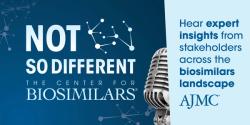© 2026 MJH Life Sciences™ and The Center for Biosimilars - Biosimilars, Health Economics & Insights. All rights reserved.
Dr Hope Rugo: Treating Breast Cancer Subtypes
Hope Rugo, MD, director of the breast oncology clinical trials program at the University of California at San Francisco, describes the challenges associated with treating different subtypes of breast cancer.
Transcript:
Which molecular subtype of breast cancer is the most challenging, treatment-wise?
Well, in terms of subtypes of breast cancer, really the challenges are—the challenges are different, but there are 2 areas of great challenge.
One is triple-negative disease that doesn’t respond to chemotherapy. That is a very difficult to treat disease, incredibly frustrating and depressing (of course more so for the patient than for us) but it’s tough as an oncologist.
I think we’re really looking towards immunotherapy being an area for us to be able to manipulate and improve outcome. We should have data about the first phase 3 immunotherapy trial later this year; we’re hopeful in any case with chemotherapy in metastatic disease. We already have some encouraging results but clearly this is very, very challenging.
Brain metastases that are refractory to radiation, incredibly challenging situation. And then the biggest patient population of challenges is [estrogen receptor—positive, ER-positive] disease that we think, “Well we have hormone therapy,” but we see late relapses. In the last month I’ve had a ton of people have a late relapse from ER-positive breast cancer, and they said to me, “Wait a minute I was 15 years out how could I have bone mets now?” or 11 years or 10.5 and you’ve just stopped their 10 years of endocrine therapy.
So, I think that that remains a huge challenge. The understanding of dormancy and pathways that are critical to us to target to try and avoid the survival of these clones that can then recur many, many years later, is really an important area of research.



